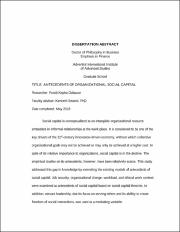| dc.description.abstract | Social capital is conceptualized as an intangible organizational resource embedded in informal relationships at the work place. It is considered to be one of the key drivers of the 21st-century innovation-driven economy, without which collective organizational goals may not be achieved or may only be achieved at a higher cost. In spite of its relative importance to organizations, social capital is in the decline. The empirical studies on its antecedents, however, have been relatively scarce. This study addressed this gap in knowledge by extending the existing models of antecedents of social capital. Job security, organizational change, workload, and ethical work context were examined as antecedents of social capital based on social capital theories. In addition, servant leadership, due its focus on serving others and its ability to create freedom of social interactions, was used as a mediating variable.
Using a positivist research paradigm, a cross-sectional survey was conducted among employees of business processing outsourcing firms in the Philippines to test the antecedents of social capital. Structural equation modeling was used to analyze the data to propose a predictive model. The study found that job security directly and positively influenced social capital (β = .310, p < .001). Servant leadership also positively and directly influenced social capital (β = .066, p < .001). Workload directly but positively influenced social capital (β = .344, p < .001). In addition, workload also indirectly influenced social capital through the mediating effect of servant leadership and job security (β = .64, p < .001; β = .581, p < .001; β = .310, p < .001). The overall model that emerged accounted for 35% of the variance observed in social capital.
The findings are significant to organizations as well as employees in creating work environment that enhances social capital, and contributes to the literature on antecedents of social capital. The study also has practical implications that include carefully assigning workload, stable and longer tenure employment practices, and the need for servant leadership within the organization. Future studies on antecedents of social capital with additional variables that include human resource practices among others should be considered. In addition, qualitative inquiry is recommended in order to identify what other factors act as the antecedents of social capital. | en_US |

